 Saint Gregory of Nyssa
Saint Gregory of Nyssa
Commemorated on January 10
My problem (and possibly yours?) has been to keep all the Saint Gregorys straight. Besides our Gregory today, there are Saint Gregory of Nazianzus (usually called Saint Gregory the Theologian), Saint Gregory the Great (Pope of Rome, whom Orthodox title Saint Gregory the Dialogist, and who was so remarkably great that we must have a Post on him sometime), Saint Gregory the Enlightener of Armenia,…
Icons by permission of Saint Isaac’s Skete
…one Saint Gregory the Wonderworker, Saint Gregory of Tours, Saint Gregory the Recluse of the Kiev Caves, Saint Gregory of Crete, Saint Gregory Palamas (who also deserves a Post), Saint Gregory of Wallachia, Saint Gregory II of Rome, Saint Gregory of Agrigentium, Saint Gregory of Decapolis, Saint Gregory founder of Gregoriou Monastery on Mount Athos, Saint Gregory of Omirits, Saint Gregory of Sinai, Saint Gregory the Hieromartyr of Tver, another Saint Gregory the Wonderworker of Vologda, Saint Gregory Domesticus of the Great Lavra on Mount Athos, Saint Gregory of Chandzoe in Georgia, Saint Gregory Archbishop of Alexandria, Saint Gregory the Iconographer of the Kiev Caves, Saint Gregory “the Byzantine” of Mount Athos, and I suspect we’ve missed some. Little wonder we get them confused.
In particular, after all these years I’m still forever mistaking Saint Gregory of Nyssa with Saint Gregory the Great of Nazianzus. Both were remarkable Fourth Century bishops, theologians and stalwart defenders of the Orthodox Faith, who lived not far apart in Cappadocia in central Asia Minor. (What ever, by the way, was going on in the Fourth Century to produce all these phenomenal theologians: “The Three Hierarchs: Basil, John Chrysostom and  Gregory the Theologian”, Church Fathers. What I would like to know is why Gregory of Nyssa isn’t up here in this icon with them. Why don’t we commemorate “The Four Hierarchs”? for I think he was as worthy as the other three. At the Seventh Ecumenical Council he was called “The Father of Fathers”.
Gregory the Theologian”, Church Fathers. What I would like to know is why Gregory of Nyssa isn’t up here in this icon with them. Why don’t we commemorate “The Four Hierarchs”? for I think he was as worthy as the other three. At the Seventh Ecumenical Council he was called “The Father of Fathers”.
Why Saint Gregory of Nyssa is so great
I’ll say only a little about his life here and concentrate instead on his words, which were multitudinous and magnificent. When I went online to search him out, I was just overwhelmed. If I live long enough and stop writing so much, I want to read more of him.
His Life
Here’s a short summary I wrote many years ago for a homily, which I guess will serve as well as anything else:
 Gregory was born in about 335 into a family of saints. His brother was Saint Basil the Great, his sister Saint Macrina who was the guiding light of the family; and another brother Saint Peter, Bishop of Sebaste. Their grandmother Saint Emilia had guided the family through the Great Persecution. Gregory was well educated and taught rhetoric for a while. He was married. He was a poet, a profound theologian, a superb preacher.
Gregory was born in about 335 into a family of saints. His brother was Saint Basil the Great, his sister Saint Macrina who was the guiding light of the family; and another brother Saint Peter, Bishop of Sebaste. Their grandmother Saint Emilia had guided the family through the Great Persecution. Gregory was well educated and taught rhetoric for a while. He was married. He was a poet, a profound theologian, a superb preacher.
However, he was not good at everything. The Church was then struggling with the Arian heresy, and his brother Basil, Archbishop of Caesarea (in central Asia Minor), whom he loved and admired, needed Orthodox bishops. So despite Gregory’s protestations that this was a mistake, he ordained him Bishop of the little town of Nyssa – none of which is left today. Apparently his wife was still living; bishops could be married in those days. People loved him. His sister Macrina wrote to him: “You are renowned both in the cities, and gatherings of people, and throughout entire districts. Churches ask you for help.” However, Gregory was right. Making him bishop was a mistake. None of us does everything well, and Gregory handled finances so ineptly * that the Arians twice got him deposed. He was not a crook; he was just a poor administrator.
- Note to my wife. Does this remind you of someone?
Gregory was, I think, the only ancient author who wrote travelogues – about events, geography, places, nature, weather. He gloried in God’s created world. Listen to his account of his return to Nyssa in 378:
Cappadocia, rain squall approching, by Janet Germer at The Oregonian
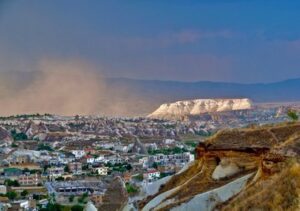 “There was a chill wind blowing through the clouds, bringing a drizzle which hit us with its dampness. The sky threatened such rain as no one had ever known and quick flashes of lightning, thunder and lightning in hurried succession, and all the mountains in front of us, behind us and on every side were shrouded with cloud… We were close to home when the cloud… suddenly emptied and because of the storm our entrance was very quiet; no one being aware of our coming. But when we reached the [porch of the bishop’s palace]..the people poured out to meet us… I know not how or why it came about but they were all there, round us so closely it was not easy to descend from the carriage… they would have crushed us with excessive kindness and I was near fainting. [Then] we saw a river of fire pouring into the church… the choirs of virgins carrying wax candles in their hands as they marched in file through the open doors of the church kindling a blaze of splendor. Then I went into the church and rejoiced and wept with my people…” (Epistle 3)
“There was a chill wind blowing through the clouds, bringing a drizzle which hit us with its dampness. The sky threatened such rain as no one had ever known and quick flashes of lightning, thunder and lightning in hurried succession, and all the mountains in front of us, behind us and on every side were shrouded with cloud… We were close to home when the cloud… suddenly emptied and because of the storm our entrance was very quiet; no one being aware of our coming. But when we reached the [porch of the bishop’s palace]..the people poured out to meet us… I know not how or why it came about but they were all there, round us so closely it was not easy to descend from the carriage… they would have crushed us with excessive kindness and I was near fainting. [Then] we saw a river of fire pouring into the church… the choirs of virgins carrying wax candles in their hands as they marched in file through the open doors of the church kindling a blaze of splendor. Then I went into the church and rejoiced and wept with my people…” (Epistle 3)
Isn’t that gorgeous? Gregory makes us feel as if we are there with him.
A year later his beloved brother Basil died. Gregory preached his funeral and was overwhelmed with grief. The next year his sister Macrina died. Gregory wrote a long and moving account of his last hours with her, she trying to assure him of how the soul lives after death. Here is a very small portion:
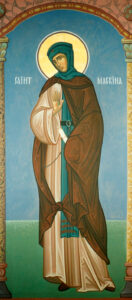
courtesy of OCA
“Lest she should vex my soul she stilled her groans and made great efforts to hide, if possible, the difficulty of her breathing. And in every way she tried to be cheerful, both taking the lead herself in friendly talk, and giving us an opportunity by asking questions. When in the course of conversation mention was made of the great Basil, my soul was saddened and my face fell dejectedly. But so far was she from sharing in my affliction that, treating the mention of the saint as an occasion for yet loftier philosophy, she discussed various subjects, inquiring into human affairs and revealing in her conversation the divine purpose concealed in disasters. Besides this, she discussed the future life, as if inspired by the Holy Spirit, so that it almost seemed as if my soul were lifted by the help of her words away from mortal nature and placed within the heavenly sanctuary.”
Nevertheless, for a while after her death Gregory went into what, I think, we would now call depression. It had all been too much to handle.
We don’t know what brought him out of it, but he emerged at a Synod in Antioch filled with the fire of the Holy Spirit. For the rest of his life he wrote and taught prolifically promoting the Orthodox faith. He taught that life is a never-ending progression, that God never intended mankind to remain in Eden but to move on towards the Heavenly City “advancing from glory to glory”.
Gregory was a major force at the Second Ecumenical Council in 381. Drawing on his brother Basil’s work, he was responsible for the last portion of the Creed, beginning “And I believe in the Holy Spirit…” He died in peace on January 10 a couple of years later. Gregory of Nyssa was one of the greatest theologians and writers the Church has ever produced.
“Rejoicing with the Angels and taking delight in the Divine Light, Gregory of Nyssa, the vigilant mind, the God inspired hierarch of the Church, and Wisdom’s revered hymnographer, intercede unceasingly for us all.” Kontakion of Saint Gregory of Nyssa
Courtesy of Greek Orthodox Archdiocese of Australia
Saint Gregory’s Teachings
It would take too much space here even to begin to list his many books, commentaries and letters. He was one of those people who just could not stop writing – and all of it brilliant. If you want to read him, note that the titles were often an excuse to proceed to write about almost anything he wanted to!
Even choosing texts to include here has been extraordinarily difficult. In just a couple hours’ perusing, I collected over 3000 words worth sharing. Holy Gregory, help! (Likely he won’t. He’d just want to write even more.) So I’m going to include most of it. Please read as much as you wish. I suspect you’ll find it hard to stop. I’ve included the sources, when I could find them
+ + + + + + +.
Here is his famous description of conversations in Constantinople at a time of theological controversy:
“The whole city is full of it, the squares, the marketplaces, the crossroads, the alleyways; rag dealers, money-changers, food-sellers, they are all busy arguing. If you ask someone to give you change, he philosophizes about the Begotten and the Unbegotten; if you inquire about the price of a loaf, you are told by way of reply that the Father is greater and the Son inferior; if you ask, “Is my bath ready?” the attendant answers that the Son was made out of nothing.” (On the Deity of the Son)
“Concepts create idols; only wonder comprehends anything. People kill one another over idols. Wonder makes us fall to our knees.”
“Truly barren is a secular education. It is always in labor, but never gives birth.”
“Be not anxious about what you have, but about what you are.”
 “Christ is the artist, tenderly wiping away all the grime of sin that disfigures the human face and restoring God’s image to its full beauty.”
“Christ is the artist, tenderly wiping away all the grime of sin that disfigures the human face and restoring God’s image to its full beauty.”
“Everything God created was very good… The story of creation (cf. Gn 1: 31) witnesses to it. Man was also listed among those very good things, adorned with a beauty far superior to all of the good things. What else, in fact, could be good, on par with one who was similar to pure and incorruptible beauty?… The reflection and image of eternal life, he was truly good; no, he was very good, with the radiant sign of life on his face” (Homilia in Canticum 12: PG 44, 1020c).
“Man was honored by God and placed above every other creature: The sky was not made in God’s image, not the moon, not the sun, not the beauty of the stars, no other things which appear in creation. Only you (human soul) were made to be the image of nature that surpasses every intellect, likeness of incorruptible beauty, mark of true divinity, vessel of blessed life, image of true light, that when you look upon it you become what He is, because through the reflected ray coming from your purity you imitate Him who shines within you. Nothing that exists can measure up to your greatness” (Homilia in Canticum 2: PG 44, 805d).
“Let us meditate on this praise of the human being. Let us also see how man was degraded by sin. And let us try to return to that original greatness: only if God is present, does man attain his true greatness. Man therefore recognizes in himself the reflection of the divine light: by purifying his heart he is once more, as he was in the beginning, a clear image of God, exemplary Beauty.”
“But what use is it to fast and abstain from eating meat if with your wickedness all you do is to gnaw at your brother? What do you gain in God’s eyes from not eating your own food if later, acting unfairly, you snatch from their hands the food of the poor?”
“Do not think that everything belongs to you! There must also be a share for the poor, God’s friends. In fact, the truth is that everything comes from God, the universal Father, and that we are brothers and sisters and belong to the same lineage”
(The previous three quotations are from “Gratio Catechetica”.)
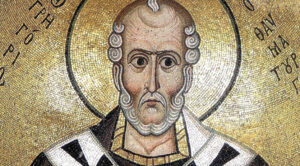
Mosaic at Osios Loukas Moni, Greece
Here was Gregory’s opinion about human slavery:
“’I got me slave-girls and slaves.’ For what price, tell me? What did you find in existence worth as much as this human nature? What price did you put on rationality? How many obols did you reckon the equivalent of the likeness of God? How many staters did you get for selling that being shaped by God? God said, Let us make man in our own image and likeness. If he is in the likeness of God, and rules the whole earth, and has been granted authority over everything on earth from God, who is his buyer, tell me? Who is his seller? To God alone belongs this power; or, rather, not even to God Himself. For His gracious gifts, it says, are irrevocable. God would not therefore reduce the human race to slavery, since He himself, when we had been enslaved to sin, spontaneously recalled us to freedom. But if God does not enslave what is free, who is he that sets his own power above God’s?”
“For when one considers the universe, can anyone be so simple-minded as not to believe that the Divine is present in everything, pervading, embracing and penetrating it?”
“As no darkness can be seen by anyone surrounded by light, so no trivialities can capture the attention of anyone who has his eyes on Christ.”
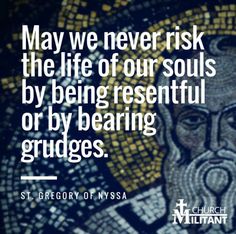
“Peace is defined as harmony among those who are divided. When, therefore, we end the civil war within our nature and cultivate peace within ourselves, we become at peace.”
“God’s name is not known; it is wondered at.”
“That we may merge into the deep and dazzling darkness, vanish into it, dissolve in it forever in an unbelievable bliss beyond imagination, for absolute nothingness represents absolute bliss.”
(The preceding are taken from GoodReads site. They did not provide the original source.)
“All that the Father is, we see revealed in the Son; all that is the Son’s is the Father’s also; for the whole Son dwells in the Father, and He has the whole Father dwelling in Himself… The Son who exists always in the Father can never be separated from Him, nor can the Spirit ever be divided from the Son who through the Spirit works all things. He who receives the Father also receives at the same time the Son and the Spirit. It is impossible to envisage any kind of severance or disjunction between them: One cannot think of the Son apart from the Father, nor divide the Spirit from the Son. There is between the three a sharing and a differentiation that are beyond words and understanding.”
“But as the soul makes progress, and by a greater and more perfect concentration comes to appreciate what the knowledge of truth is, the more it approaches this vision, and so much the more does it see that the divine nature is invisible. It thus leaves all surface appearances, not only those that can be grasped by the senses but also those that the mind itself seems to see, and it keeps on going deeper until by the operation of the spirit it penetrates the invisible and incomprehensible, and it is there that it sees God. The true vision and the true knowledge of what we seek consists precisely in not seeing, in an awareness that our goal transcends all knowledge and is everywhere cut off from us by the darkness of incomprehensibility. Thus that profound evangelist, John, who penetrated into this luminous darkness, tells us that no man hath seen God at any time (John 1:18), teaching us by this negation that no man – indeed, no created intellect – can attain knowledge of God.”
(The previous two quotations are from Gregory of Nyssa’s Mystical Writings, translated and edited by Herbert Mursillo, St. V1adimir’s Seminary Press, 1979).
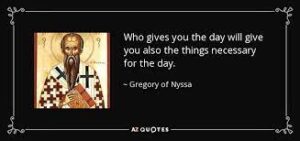 “
“
(The Lord’s Prayer, Sermon 4)
“There is one true and perfect power which is above all things and governs the whole universe. But it rules not by violence and tyrannical dictatorship, which inforces the obedience of its subjects through fear and compulsion.” (The Lord’s Prayer – The Beautitudes)
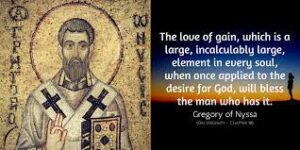 “As, when one torch has been fired, flame is transmitted to all the neighbouring candlesticks, without either the first light being lessened or blazing with unequal brilliance on the other points where it has been caught; so the saintliness of a life is transmitted from him who has achieved it, to those who come within his circle.”(On Virginity – Chapter 18
“As, when one torch has been fired, flame is transmitted to all the neighbouring candlesticks, without either the first light being lessened or blazing with unequal brilliance on the other points where it has been caught; so the saintliness of a life is transmitted from him who has achieved it, to those who come within his circle.”(On Virginity – Chapter 18
(On Virginity – Chapter 18)
“Just as at sea those who are carried away from the direction of the harbor bring themselves back on course by a clear sign, on seeing a tall beacon light or some mountain peak coming into view, so Scripture may guide those adrift on the sea of the life back into the harbor of the divine will.”
“Since some ecclesiastics deem it right to stand always by the literal meaning of the Holy Scripture and do not agree that anything in it was said through enigmas and allegories for our benefit, I consider it necessary first to speak in defense of these things to those who bring such accusation against us, because in our view there is nothing unreasonable in our seriously studying all possible means of tracking down the benefit to be had from the divinely inspired Scripture.
If indeed the literal meaning, understood as it is spoken, should offer some benefit, we will have readily at hand what we need to make the object of our attention. But if something that is said in a hidden fashion, with certain allegories and enigmas, should yield nothing of benefit according to the readily apparent sense, we will turn such words as these over and over in our mind.” (Commentary on the Song of Songs)

Here’s what Saint Gregory thought the vain, especially about kings and emperors – which applies perhaps (who knows?) even to Presidents and Prime Ministers:
“Are you not ashamed, you little clay doll, soon to be dust, blown up like a bubble with your own momentary puff, full of pride, all swollen with inflamed delusion and inflating your mind with empty conceit? Do you not see at each end the limits of human life, how it begins and where it ends?…
“…Those… who strut on the stage of life because of imperial office… They stay no longer within the bounds of human nature, but assume divine power and authority. They believe they have sovereignty over life and death because to some of those who are judged by them they give sentence of acquittal, while others they condemn to death; and they do not even consider who is truly the sovereign of human life and determines both the beginning of existence and its end. Nevertheless this alone should have been enough to restrain vain conceit, the sight of many rulers even during the performance of their reign snatched from their very thrones and carried out to their graves, and for them lamentation has replaced the cries of the heralds. How then can he be sovereign over life which does not belong to him, when his own does not belong to him? Even that person, therefore, if he becomes poor in spirit, looking to the one who willingly became poor because of us, and observing the equal respect we owe to members of our race, will not inflict injury on those who share his origin as a result of that mistaken masquerade of government.”
“Evil will come to nought and will be completely destroyed. The divine, pure goodness will contain in itself every nature endowed with reason; nothing made by God is excluded from His kingdom once everything mixed with some elements of base material has been consumed by refinement in fire.” (A Treatise on 1 Corinthians 15.28)
Read this carefully. Did Saint Gregory hope that, in the End, all will be saved? even Satan himself!
“This truly is the vision of God: never to be satisfied in the desire to see Him. But one must always, by looking at what he can see, rekindle his desire to see more… In the same manner, after the evil of the [human] nature which is now mingled and united with it has been removed through long periods of time, when the restoration of those now lying dead in evil to the original state has come to pass, there will be a harmonious thanksgiving from all creation, even from those who needed no purification in the first place. The great mystery of the divine Incarnation grants these and other such things. For through those things which were mingled with human nature – birth, rearing, growth, even to the extent of going through the experience of death – He accomplished all the aforementioned things, both freeing humanity from evil and healing even the originator of evil himself. For the purification of moral disease is the healing of illness, even if it is painful.”

Holy, Wise and Beneficent Gregory, Bishop of Nyssa, thank you. Pray for us and for our salvation.
Next Week: How can we believe this impossible thing? that the salvation of the world lies in only One Man: Jesus of Nazareth.
Week after Next: Believe it or not, we begin to prepare for Pre-Lent with The Sunday of Zacchaeus.
Thank you, for finding the time to prepare and post these comments , Father Bill. Another good post, as usual. Without you are doing this, I and many others would know nothing about this Saint Gregory.
Thanks, John. Without my doing the Post, I also “would know [almost] nothing about this Saint Gregory”!